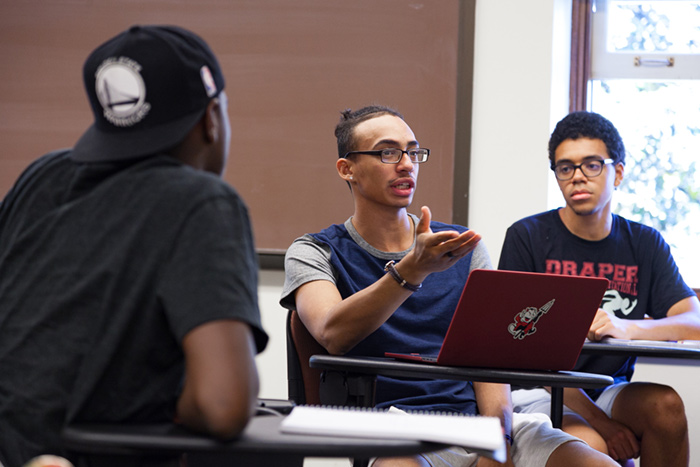An Abridged Ode to My First-Year Seminar

First-Year Seminar photo by Carl Socolow '77.
by Alexander Bossakov '20
The Ideas That Shaped the World seminar I took my first year at Dickinson is an embodiment of the education I came to the United States for. It represents the fundamental issues in humanistic inquiry from the earliest recorded human thought to modern-day philosophy. Students and professors work across a round table and a range of texts to uncover, challenge and articulate ideas about human nature, justice, morality—whether it’s a hypothesized universality, unsettled definitions or compellingly controvertible interrelationships.
From Plato to Shakespeare to Nietzsche to Marx to DuBois (and the list can and should be criticized for its andro- and eurocentrism), Ideas That Shaped the World helped me build an intellectual foundation that thoroughly influenced my thinking. I experienced the stimulating experience of seeking, of appreciation and of realization that comes with a liberal arts education: the ability to put Marxist theory in conversation with poetry in an English class; to compare a political scientist’s interpretation of Plato’s notion of justice with that of a scholar of Judaic studies; to recognize the elements of DuBoisian thought that persevere in contemporary society and those that have undergone transformation.
And this is the essence of First-Year Seminars at Dickinson. Each seminar possesses an identity of its own, a level of idiosyncrasy, depth and complementary breadth. The individual specificity of each seminar does not translate into esotericism; on the contrary, it is intellectually liberating and intentionally far-reaching. First-Year Seminars grant students an epistemological lens which profoundly marks their careers at Dickinson.
Ideas That Shaped the World is just one example—one that is perpetually brought back to me as I advance in my college career. It is also certainly the most popular one with several sections provided each fall, each one taught by professors from departments all over campus. This creates a unique space for interdisciplinary contact: how can we make Plato’s The Republic useful in our understanding of democracies vis-à-vis tyrannies? How can Shakespeare’s The Tempest point us to challenge past notions of colonialism and moral relativism? How are these questions addressed differently by a professor of history and a professor of music? What about a professor of computer science or a professor of sociology? First-year students at Dickinson have answers to these questions because they have indulged in this inquiry from their very first days on campus.
While researching and writing the First-Year Seminar 101 article, Alexander Bossakov ’20 was inspired to pen this firsthand perspective on how his FYS influenced him.
Read more from the winter 2018 issue of Dickinson Magazine.
TAKE THE NEXT STEPS
Published January 23, 2018